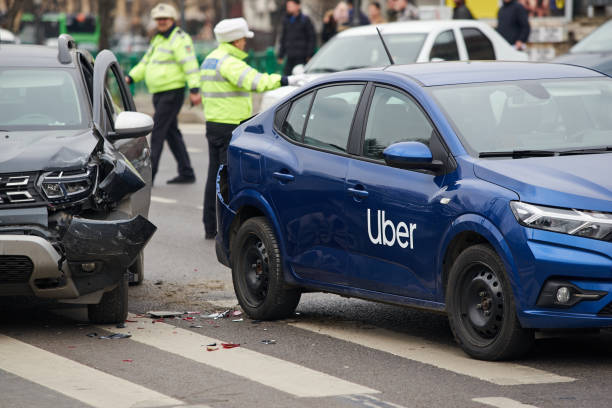Derby Rideshare Accident Lawyer
Do you need a Derby rideshare accident lawyer? If you or a loved one has been involved in an accident with an Uber, Lyft, or rideshare driver—whether as a passenger, another driver, or even a pedestrian—you have rights. Understanding these rights and navigating the complexities of rideshare accident claims requires the help of an experienced attorney. At Etemi Law, we are dedicated to helping victims of rideshare accidents receive the compensation they deserve.
Call us today at (203) 409-8424 for a


The Reality of Rideshare Accidents
Uber and Lyft have revolutionized transportation, providing millions of rides daily across the U.S. However, with the rise of these services, the number of rideshare-related accidents has also increased. Research from Rice University and the University of Chicago suggests that ridesharing services have contributed to a 2-3% increase in U.S. traffic fatalities since 2011, leading to up to 1,100 deaths annually.
Common Causes of Rideshare Accidents
Uber and Lyft drivers often operate under challenging conditions, increasing their risk of accidents. Some of the most common causes include:
- Distracted Driving – Relying on GPS, accepting ride requests, and managing passengers can divert a driver’s attention.
- Driver Fatigue – Many rideshare drivers work long hours or multiple jobs, leading to drowsy driving.
- Unfamiliar Routes – Navigating new areas can cause sudden stops or erratic driving behavior.
- Poor Vehicle Maintenance – Rideshare drivers are responsible for keeping their vehicles in good working condition, but lapses can lead to preventable accidents.
Connecticut Rideshare Laws and Regulations
Connecticut has strict laws governing rideshare companies and their drivers. These include:
- Mandatory Background Checks – Uber and Lyft must conduct background checks on all drivers, including a criminal record and driving history review.
- Vehicle Safety Requirements – Vehicles must pass inspections and meet specific safety criteria.
- Insurance Coverage – Rideshare companies must provide at least $1 million in liability coverage when drivers are transporting passengers.
- Driver Hour Limits – Uber and Lyft drivers can work a maximum of 14 consecutive hours and 16 hours in a 24-hour period to prevent fatigue-related accidents.
Who is Liable in a Rideshare Accident?
Determining liability in an Uber or Lyft accident can be complex, as multiple insurance policies may be involved. Our legal team at Etemi Law will investigate your case to establish liability and maximize your compensation.
If Another Driver is At Fault
- The at-fault driver’s insurance is the first line of compensation.
- If the at-fault driver is uninsured or underinsured, Uber/Lyft’s uninsured motorist coverage may apply.
If the Rideshare Driver is At Fault
- If the driver was logged into the app and waiting for a ride request, Uber/Lyft provides $50,000 per person/$100,000 per accident in bodily injury coverage.
- If the driver was transporting a passenger, Uber/Lyft provides $1 million in liability coverage.
- If the driver was off duty, their personal auto insurance applies.
Why You Need a Derby Uber and Lyft Accident Lawyer
Rideshare accident cases involve multiple insurance companies and complicated liability issues. Insurance companies often try to minimize payouts, but with an experienced attorney from Etemi Law, you can fight for the full compensation you deserve.
Our legal team will: ✅ Investigate the accident thoroughly ✅ Obtain key evidence, including rideshare records and driver logs ✅ Negotiate aggressively with insurance companies ✅ Take your case to court if necessary
Contact Etemi Law Today
If you or a loved one has been injured in an Uber or Lyft accident, don’t wait. Protect your rights and get the compensation you deserve. Contact Etemi Law today for a free consultation.
📞 Call us at (203) 409-8424 💻 Visit us online to schedule your case review
As winter settles over Derby, black ice sneaks into the seams where Route 34 narrows near the Bridge Street connector – a familiar choke point for rideshare pickups and commuter merges. I’ve watched drivers lose traction on sheen that looks like wet pavement, turning routine trips into low-speed collisions, T-bones and rollovers. Those mechanisms – sudden braking, fishtailing on untreated ramps – shape the pattern of injuries EMTs see and the delays that follow.
Along the Derby Greenway, rideshare drop-offs for weekend errands become precarious in freezing temperatures. Passengers stepping out onto slick wooden boardwalks or drivers skidding into curbs produce sprains, hip fractures, concussions and soft-tissue injuries that can look minor at the curb. In icy conditions, bystander aid and ambulance access are hampered, changing initial transport decisions and often resulting in longer on-scene times and delayed destination choices.
Call-takers route many Derby crashes to Griffin Hospital, where winter caseloads often include a cascade of orthopedics, chest-trauma evaluations and head-injury workups originating in rideshare collisions. I’ve followed cases where initial stabilization required interfacility transfer for CT scans or specialty orthopedic care, extending total transport time. Those transfer patterns influence rehabilitation timelines – from outpatient physical therapy referrals to longer inpatient stays at regional centers.
Near the Naugatuck River crossings, falling temperatures turn runoff into invisible hazards that betray an otherwise routine rideshare trip. Drivers unfamiliar with Derby microclimates underestimate localized black ice; clinicians and insurers see a clustering of wrist fractures, clavicle breaks and cervical strain after curbside impacts. Those injury clusters explain why some patients move through staged care: ambulance to emergency room, then scheduled transfer to specialty clinics or a rehabilitation program.
